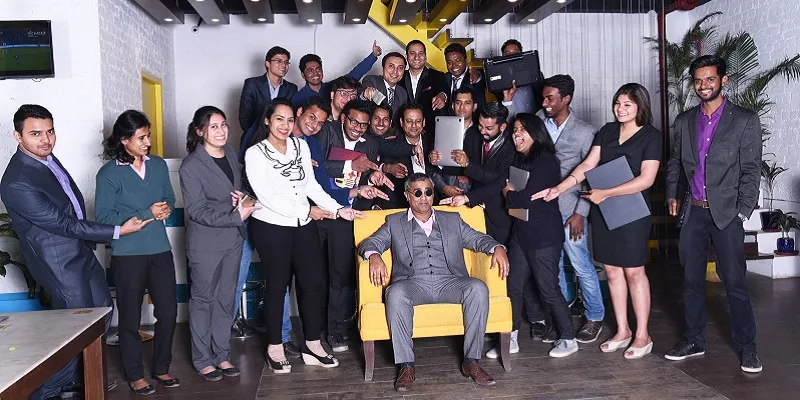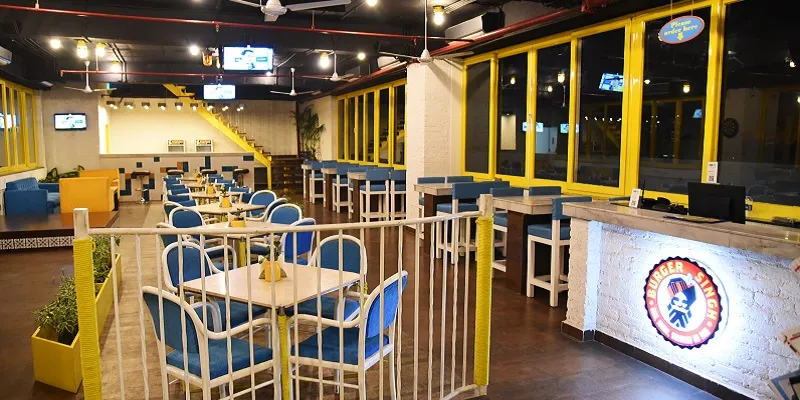The MBA grad who worked at a burger outlet in UK now runs several Burger Singh stores across India
Started in 2014, Burger Singh clocked revenue of Rs 6.5 crore in FY 2016-17. The ‘Subway of Burgers’ is targeting Rs 16 crore revenue this year.
It was the end of Kabir Jeet Singh’s shift at the burger shop. Like every evening, he got his free burger at the end of his shift. But that day he was bored of the bland patty-and-mayo burgers and wanted something different.
Kabir, an MBA student at University of Birmingham, like any Indian student studying abroad worked the evening shift at a burger shop and the night shift at a bar to make ends meet. Wondering how he could bring in tastes he truly craved, he decided to experiment with a few spices. He added a spice blend to the meat before cooking the burger patty.
“I would pick up packs of Shan Spices from a neighbouring store and add them to the burgers. Soon they started becoming popular with my colleagues and I started making for them as well,” Kabir says.
Understanding the recession-proof markets
His “fusion” burgers gained in popularity and soon made their way into the burger shop’s weekend menu. From there, he began selling his burgers at university cookouts. This was where he got the name he’s now synonymous with – “Burger Singh”. Little did he know that in the next few years it would be the name of his restaurant chain in India.
After graduating Kabir started working in London and got a degree from Oxford. It was 2008 when he returned to India.

“It was the worst time to be an MBA. The markets were in the worst possible shape, ” Kabir says. By then, he had started working at Beer Café in Delhi. He was fascinated by the industry because it seemed to be one of the few industries, after pharma, which seemed recession-proof.
It was at the Beer Café that Kabir got an understanding of the business side of the food and beverages market. He learnt about real-estate requirements, branding and commercials.
A couple of years down the line, he decided to revisit his burger-making days and in November 2014 launched Burger Singh in Gurgaon.
The pains of setting up
But setting up Burger Singh wasn’t a piece of cake.
Kabir didn’t have the resources of an already established burger store. It was no longer a matter of picking up packets of Shan Spices; he needed to do a lot of leg work and travel. Kabir was also keen to standardise the model and not follow a chef-centric approach.
“Burgers are a massively franchisable product. But to do so, it is important to get the standardisation and models right. I sat down with food processors, vendors and spice blenders to understand how the processor model would work,” Kabir explains.
The first order of business was sourcing. For vegetarian products, Kabir tied up with a vendor in Panvel, Mumbai, and for non-vegetarian products, he tied up with a vendor in Hyderbad.
Not keen to disclose the names of these vendors, Kabir says his vegetarian products vendor supplies to Cosmo in the US and the vendor for non-vegetarian products supplies to Tesco in the UK. Tying up with them meant somewhat higher costs, but Kabir decided on the investment for long-term benefits.
“I travelled across Punjab and Bihar and tied up with major spice blenders in the country to develop different blends,” he says.
However, settling on the vendors and blenders meant going through several trials and tests, picking the wrong vendors and then choosing the correct one.
“I had over 172 trials for the Rajma Burger before we actually put it on the menu. This meant that I would eat Rajma every day for two years!” Kabir exclaims.
Starting smaller-format stores
However, Kabir remained focused on quality as he knew that a supply chain and robust logistics system are what ensures the growth of a food business.
Burger Singh started with Kabir’s personal savings and money borrowed from friends and family. The first store was set in a 500 sq ft space in Gurgaon, Sun City. Kabir says they broke even in three months, which helped them open the other stores.
“One outlet cost Rs 30 lakh and we started with two. The cash breakeven that we achieved helped us open our other stores,” he explains. He adds that choosing a smaller store area was a good idea as rentals were at Rs 60,000 and the outlets had started making close to Rs 10 lakh in revenue.
The team is now looking to open larger-format stores, which follow the dine-in concept. With an area of 3,000 sq ft, these restaurants serve alcohol along with burgers.
Known as ‘Glassy’, Kabir explains these stores also work as Burger Singh labs, where new recipes are tested and distributed across the market.

Funding and revenue
Burger Singh has so far raised external capital of $1 million from October 2015 till date. The investors include Ashvin Chadda, Rahul Singh (Beer Café), Dheeraj Jain (Redcliffe Capital), Rannvijay Singh (MTV Roadies), Capt Salim Sheikh (ex -Sayaji Hotels) and Avtar Monga (COO of IDFC Bank).
Kabir says 20 percent of the money raised went into building the technology and supply chain, 40 percent into building the outlets and remaining for the salaries of the core team. As of FY 2016-17, the team claims to have made revenues of Rs 6.5 crore with a 37 percent growth.
According to a report by Assocham, India’s quick service restaurants (QSR) market is expected to touch Rs 25,000 crore by 2020. Currently estimated at Rs 8,500 crore, the country’s QSR market is growing at a CAGR of 25 percent.
The QSR space has witnessed the entry of various national and international players owing to urbanisation, increased spending by youth, nuclear families and better logistics.
Known as a late entrant (November 2014) into India’s fast-food market, Burger King in April announced that it would open 35-40 outlets this year across the country.
Burger King currently has 48 stores in India. Last year, it opened up in 13 cities, including Bengaluru, Mumbai, Delhi, Hyderabad, Punjab and Pune. However, even McDonalds is shutting several of its outlets in Delhi.
While Kabir agrees that Burger Singh doesn’t have the same funds as larger players, he believes he knows the India market a little better.
“We are targeting revenue of Rs 16 crore this year and looking to expand pan-India. I believe Burger Singh to be the Subway for Burgers. It is one of the best working models that you can aim for India,” Kabir says.







